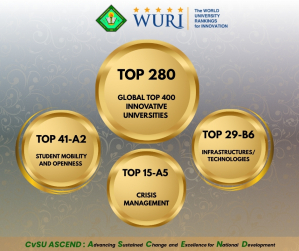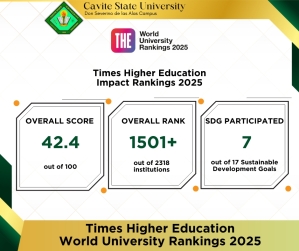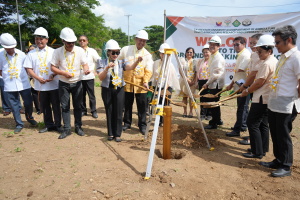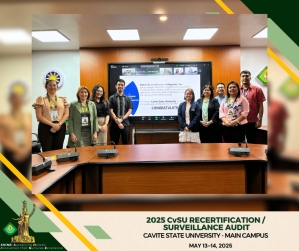Historical Background
The Graduate School started to offer Master of Science (MS) major in Agricultural Education, Animal Husbandry and Agronomy during the First Semester of Academic Year 1985 – 1986.
During the Second Semester of 1988-1989, it had its first enrollees in the MS in Horticulture program, while the Agricultural Production Technology had its first enrollees during the First Semester of 1989-1990. Meanwhile, the MS in Agricultural Extension, MS in Farming Systems and MA in Education programs were first offered in the First Semester of Academic Year 1990-1991.
Doctor of Philosophy (PhD) in Crop Science and Animal Science had its first batch of students in the First Semester of 1995-1996 while the Master of Agriculture program had its first batch of students in the Second Semester of the same Academic Year. On the other hand, it was during the Second Semester of 1996-1997 when the PhD in Farming Systems and Diploma in Physical Education had its first enrollees.
In the First Semester of 1997-1998, students registered in the PhD in Education, MS in Plant Protection, Master in Business Administration and Master of Agricultural Science and Technology programs while the first group of PhD in Horticulture students registered in the First Semester of 2000-2001.
Master of Management and PhD in Agriculture programs had its first group of students in the First Semester of 2004-2005 while Distance Education MS in Agricultural Engineering and MS in Biology programs had its first enrollees during the Second Semester.
During Academic Year 2005-2006, Master of Professional Studies and Master of Engineering had its first batch of students in the First Semester while PhD in Information Technology had its first group of enrollees during the Second Semester.
At present, the Graduate School offers 22 graduate programs.
Open Learning College
The Open Learning College (OLC), initially named the Open University System (OUS), was launched in January 1997. Its establishment was made possible primarily through the support of Hon. Jose de Venecia, recognized as the “Father of Distance Education” in the Philippines. The first Dean of the College was Dr. Constancia G. Cueno.
During this time, the College focused on conducting trainings in computer literacy, education, food processing, business management and the arts, among others. In fact, the College was able to conduct 16 trainings on its first year, accommodating 1,013 participants in its various programs. Most of these were farmers, housewives, SUC heads and personnel, students from various school, members of cooperatives within the region and, faculty and staff from the University.
The Module Development Program was also instituted during this period. To produce the materials needed for the DEP, a module writing workshop was conducted. The modules and learning guides were produced for the MA in Education (MAEd), Master of Agriculture (MAgr), MS in Farming Systems, MS in Agronomy and MS in Agricultural Extension programs. Techno-guides were produced to promote the technologies developed by the University, and information materials were likewise made for the College (i.e. brochures; bulletins of information) to assist in promoting its programs. Pamphlets from the National Training and Demonstration Center for Fruit and Vegetable-Based Products and the Technology and Livelihood Resource Center (TLRC) were also made available to the public.
Linkages with various agencies were also established, such as with the Department of Agrarian Reform (DAR), Department of Agriculture (DA), Cooperative Development Authority (CDA), Department of Social Welfare and Development (DSWD), Department of Trade and Industry (DTI) and local government units from Batangas and Quezon. Preparations were also made for the establishment of learning centers in Batangas and Quezon.
In 1998, similar objectives were pursued by the College but focus was placed on the production of instructional materials, conduct of enrolment campaigns and coordination with other agencies regarding the establishment of learning centers.
Moreover, to better implement the programs of the OLC, it formulated specific policies and guidelines, in addition to the Implementing Guidelines approved by the Board of Regents (BOR) during the past year.
Four trainings were conducted during the year (1-national level, 1-provincial and 2-local level trainings). The locations of potential learning centers were also modified. Moreover, negotiations were done with local government units in Batangas and Quezon.
Radio studio equipment was acquired during the first quarter of the year. Although the College was able to secure air time with theRadyo ng Bayan network, the high costs involved in the acquisition of PLDT broadcast lines and the setting up of a transmitter tower, prevented the studio from becoming operational during this time.
Dr. Alejandro C. Mojica was appointed as the new Dean in 1999. It was in this year when the distance education program (DEP) of the OLC shifted to full gear.
Two graduate programs, the Master of Arts in Education (MAEd) and the Master in Agricultural Science and Technology (MAST), were officially opened for enrolment this year. There were 20 enrollees, both for the MAEd (Cavite & Las Piñas-5 and Occidental Mindoro–15) and MAST (all from Cavite) programs. On the other hand, the College continued conducting the training “Classroom Management and Teaching Strategies” for faculty members of the University. It was in this year when the learning center in San Jose, Occidental Mindoro was opened.
The OLC likewise continued its commitment to serve farmers and other members of the rural community, through its outreach programs. Four training needs assessments (TNAs) were conducted in Magallanes, Gen. Trias, GMA and Bacoor, Cavite. This was done to discover what training programs are needed by the communities concerned, which could be assisted by the OLC. The College has also provided support to various agencies, both in the government and private sectors, in the conduct of their training activities, specifically as resource speakers, training designers and facilitators.
The Open Learning College was merged with the Graduate School (GS) in 1991. Dr. Marietta C. Mojica, incumbent Dean of the Graduate School, was appointed as the new Dean of the merged GS-OLC.
In the same year, the OLC offered a new program, the Master of Agriculture (MAgr) program, as an option for students who prefer to pursue a non-thesis program in agriculture. It likewise maintained the operation of its learning center in Occidental Mindoro Polytechnic College (OMPC). Other activities included the revision of 5 modules for the DEP and the purchase of 41 new books for the GS-OLC Reading Room.
A memorandum order (CMO 5 s. 2002) from the Commission on Higher Education (CHED) putting all distance education programs under moratorium was pronounced in 2002. This was a major setback in the operations of the OLC, particularly in the offering of graduate education programs through the distance mode. Thus, the implementation of the graduate programs of the OLC was put on hold until 2004 during the time of Dr. Lorna L. Penales as dean of GS-OLC
In 2005 CHED issued Memorandum order no. 27 s. 2005 about rationalizing Distance Education (DE) in the Philippines. Hence, through Office Memorandum No. 25 s. 2005, the OLC was given the authority to revive its operations. A new Dean, in the person of Dr. Antonio G. Papa, was appointed for this purpose.
Eleven students enrolled in two graduate programs, namely PhD in Education major in Educational Management (10) and MA in Education (1). Applications to the MA in Education and Master in Business Administration (MBA) programs were also processed during this time. Concurrently, the maiden issue of the GS-OLC Research Journal was published this year. This issue contained five research papers from various CvSU faculties.
In 2006, Dr. Amornita C. Sanchez, the dean of the Graduate School, looked for the old students of OLC from Occidental Mindoro and encouraged them to continue their studies in CvSU. She was able to find five (5) MAgr students. They enrolled in OLC. Hence, in addition to the two (2) programs being offered by OLC in 2005, another two (2) programs were offered in 2006. They were the Master in Agriculture and Master of Business Administration programs. Thus, the College was able to have a total of 31 enrollees where five of them were foreign students from Myanmar (3) and South Korea (2).
In March of 2007, Dr. Amornita C. Sanchez, in addition to her other designation as Dean of the Graduate School, was appointed Dean of the Open Learning College due to the resignation of Dr. Papa. In May of the same year, five MAgr students graduated. They were the first graduates of OLC.
In June of the same year, the GS and OLC were again merged. Dr. Amornita C. Sanchez was designated Dean. The College started to offer new programs like PhD in Agriculture, Master of Professional Studies major in Public Administration and Bachelor of Science in Information Technology. About 59 students enrolled in various programs of the college.
On August 22, 2007 OLC was again separated from GS and was transferred to a new office at the 4th floor of the Ladislao Diwa Memorial Library and Museum. Dr. Amornita C. Sanchez was retained as its Dean.
In 2008, the College offered eight (8) graduate and undergraduate programs through online/ distance mode in coordination with the College of Education (CED), the College of Economics, Management and Development Studies (CEMDS), the College of Engineering and Information Technology (CEIT), and the College of Agriculture, Forestry, Environment and Natural Resources (CAFENR). The courses offered were: Doctor of Philosophy in Agriculture, Doctor of Philosophy in Education, Master in Agriculture, Master in Business Administration, Master of Arts in Education, Master of Professional Studies, Bachelor of Science in Information Technology, and Bachelor of Science in Agriculture. The college also offered three (3) baccalaureate degree programs through the Expanded Tertiary Education Equivalency and Accreditation Program (ETEEAP). These were the Bachelor of Science in Hotel and Restaurant Management, Bachelor of Elementary Education and Bachelor of Science in Business Management. The offering of these courses was made possible through the utilization of the new generation Learning Content Management system under the www.edu20.org website for online teaching and instructions.
A total of seven (7) students graduated from the academic programs offered by the College in 2008. One (1) graduated in April while six (6) attended the November graduation. Five (5) students from as far as Occidental Mindoro were able to satisfy the requirements for graduation for the MAgr program, while two (2) students from Cavite and Las Piñas City finished their courses (BSHRM and BEE, respectively) under ETEEAP.
It was also in 2008 when the College continued to prepare for its application to CHED to offer distance education. It has conferred with its officials regarding the requirements for seeking government authorization. A task force to prepare the documents needed for this was also formed. The forms necessary for the said accreditation were also prepared. A proposal regarding the allocation of workload units to faculty members who prepared online modules was prepared and later approved by the BOR, per resolution no. 35 dated October 6, 2008. This was done to expedite the preparation of modules, one of the major requirements for the application to CHED to offer distance education.
The College conducted a “Seminar-Workshop on Designing Instructions for Online Learning on January 31, 2008. This was participated by 19 faculty members from the CAFENR, CED, GS, and OLC. The topics discussed during the said workshop were “Foundations for Online learning,” “Designing Instructions and Delivering for Online learning”, and “Learning Content Management System for Instructional Transmission”
OLC faculty members prepared and revised a total of 27 modules for offering of doctorate and master’s degree programs. The audio and video multimedia content were also created to facilitate the delivery and access to these modules. The College organized these instructional materials according to the global standard of the SCORM (Sharable Content object Reference Model).
OLC also conferred with CHED – ETEEAP Region 4 officials regarding the requirements for the implementation of seven (7) degree programs under the ETEEAP. The Policies and Guidelines in the Implementation of ETEEAP was revised and later approved by the BOR per Resolution No. 96, dated October 6, 2008.
In 2009, the OLC continued its operation by offering eight (8) academic programs through distance education. To support the offerings, 28 modules for online teaching of masters and doctorate degree programs were prepared. OLC continued the offering of the BS Hotel and Restaurant Management and BS Business management programs through ETEEAP. The Assessment Team to accredit the applicants to these programs was created. To expedite the evaluation of student applicants to the programs under ETEEAP, A Revised Policies and Guidelines in the Operation of Programs under ETEEAP was prepared. The said guidelines were approved by the BOR per Resolution No. 85, dated September 3, 2009. Likewise, A CvSU Primer on ETEEAP 2009 was prepared.
A total of five (5) students satisfied the requirements for graduation for the Master in Agriculture. Their degrees were conferred during the 85th University Commencement Exercises on November 6, 2009. Four (4) of them came from Occidental Mindoro while one (1) graduate came from Cavite.
The College worked in partnership with Dr. Jericardo Mondragon, the president of the Philippine Institute of Intellectual Services Company (PIISC), in the implementation of the Professional Academic program (PAP). The program is covered by MOA between his institution and CvSU which was approved by the BOR per Resolution No. 70, dated August 15, 2008, and signed by both parties on September 9, 2008. A committee to screen the applicants under PAP was approved by the University President. After series of evaluation done by the College to select the qualified students for the various programs offered, a total of 58 students were admitted.
Through the years, OLC is looking forward to bring quality education to as many individuals as possible by minimizing if not fully eliminating the barriers suggested by traditional education.
In 2010, OLC was merged again with the GS. Dr. Lilibeth P. Novicio was designated Dean of the merged GS and OLC.



